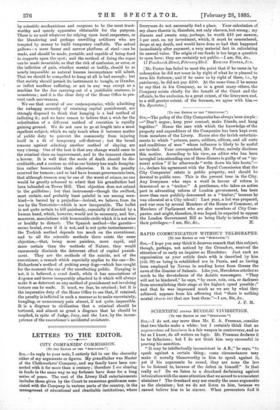LETTERS TO THE EDITOR.
CITY COMPANIES' COMMISSION.
[TO THE EDITOR OF THE SPECTATOR."]
SIR,—In reply to your note, I entirely fail to see the obscurity either of my arguments or figures. My grandfather was Master of the Clothworkers' Company, and my family have been connected with it for more than a century; therefore I am sharing in funds in the same way as my forbears have done for a long series of years. The cost of the Livery Hall entertainments includes those given by the Court to numerious gentlemen associated with the Company in various parts of the country, in the management of educational and charitable • institutions, where
liverymen do not necessarily find a place. Your calculation of my share therein is, therefore, not only obscure, but.wrong; my dinners and sweets may, perhaps, be worth £10 per annum, 5 per cent. on my investment, which, it must be remembered, drops at my death, and would have done so had that happened immediately after payment, a very material fact in calculating its annual value. The origin of our fends is too large a question
to open here; they are certainly not public.—I am, Sir, &c., • 17 Fenchurch Street, February 23rd. EDUOND FOSTER, Juts% [Mr. Foster has failed to meet the point that if he came in by redemption he did not come in by right of what he is pleased to term his forbears; and if he came in by right of them, i.e., by patrimony, he did not pay £200. At the same time, if he means to say that in his Company, as in a great many others, the Company exists chiefly for the benefit of the Court and the officials, to the exclusion, to a great extent, of the liverymen and, to a still greater extent, of the freemen, we agree with him.— ED. Spectator.] rTo THE EDITOR OF THE ",SPECTATOR.".] Sin,—The policy of the City Companies has always been simple; —"Don't argue; keep your counsel, make friends, and hang together." Hence the care with which the knowledge of the property and expenditure of the Companies has been kept even from members of the Livery. Hence also the lavish entertainments to which "princes, peers, soldiers, editors, and all sorts and conditions of men" whose influence is likely to be useful are invited. Your correspondent, Mr. Foster, naïvely discloses this motive. According to his view, an editor who has been inveigled into attending one of these dinners is guilty of an "mmmoral action" if he afterwards "write down his late hosts,"i.e., declare his agreement with the Royal Commission that the City Companies' estate is public property, and should be devoted to public uses. This is the present tone in the City. Any liveryman who says a word in favour of reform is denounced as a traitor." A gentleman, who takes an active part in advocating reform of London government, has been more than once publicly denounced as a "traitor," because he was educated at a City school ! Last year, a list was prepared, and was seen by several Members of the House of Commons, of Members of Parliament who are also members of City Companies, and might, therefore, it was hoped, be expected to oppose the London Government Bill as being likely to interfere with
their privileges.—I am, Sir, &c., H.
RAPID COMMUNICATION WITHOUT TELEGRAPHS.
[To THE EDITOR OF THE " $PECTATOIL.1
hope you may think it deserves remark that this subject, though, perhaps, not noticed by the Crusaders, received the attention of so early an inquirer as Herodotus. Just such an organisation as your article deals with is described by him (viii. 98) as being in established use in Persia, and as having been employed by Xerxes in sending home from Greece the news of the disaster of Salamis. Like you, Herodotus attributes much to the devotedness of the Asiatic messengers. "They will not be hindered," he says, "by snow, rain, sun, or darkness from accomplishing their stage at the highest speed possible ;" and that he was impressed much as we are by what they achieved, appears from his affirming that "there is nothing mortal (OperOm us) that can beat them."—I am, Sir, &c., J. F. M.


































 Previous page
Previous page